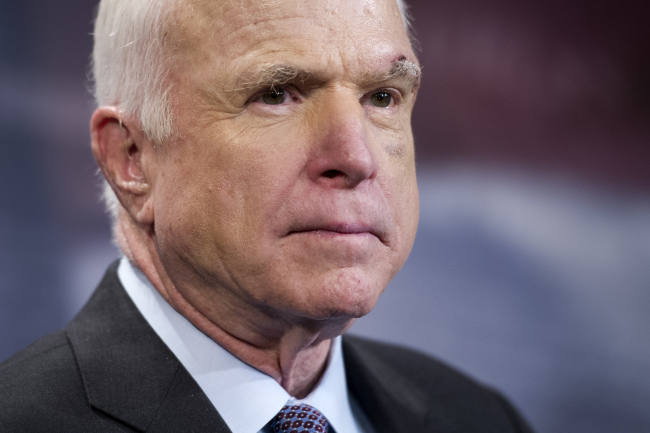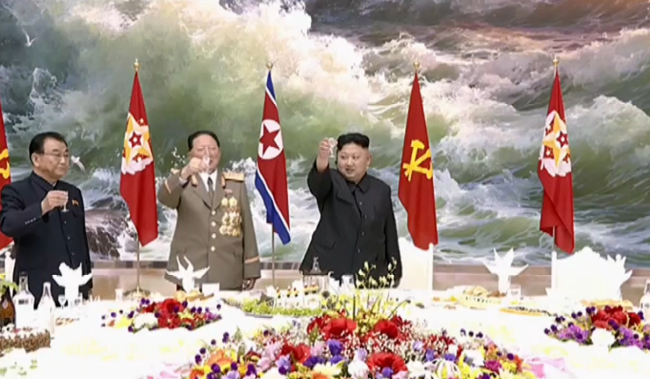Despite repeated rebuttals from the South Korean government, talk of bringing US tactical nuclear weapons here continues to grow, with signs of Washington warming to the idea amid North Korea’s persistent nuclear and missile threats.
But experts here are still cautious, questioning whether the US would really have the intention to redeploy tactical nukes on the Korean Peninsula, risking sparking military tensions in Northeast Asia, and potentially, a regional nuclear arms race.
Over the past few days, South Korea has been roiled by a series of remarks from Washington’s policymakers who said they might consider the measure in order to strike a nuclear balance with North Korea following its sixth and largest nuclear test on Sept. 3.
In an interview with CNN on Sunday, Sen. John McCain, chairman of the Armed Services Committee, said that it “ought to be seriously considered” in response to a question about his stance on Seoul’s Defense Minister Song Young-moo’s comment about bringing back the US nukes last month.
 |
Sen. John McCain, chairman of the Armed Services Committee. Yonhap |
“If you allow (North Korea’s leader Kim Jong-un) to have nuclear weapons and South Korea, Japan and others who are under our “nuclear umbrella,” don’t, I think that’s out of balance,” he said “(The US needs to) make sure that Kim Jong-un knows that if he acts in an aggressive fashion, the price will be extinction.”
The measure should go along with the efforts to enhance the allies’ missile defense capabilities against North Korea and increase pressure toward China, the senator added, criticizing Beijing for failing to put the brakes on the communist regime’s nuclear ambition.
His comments came after an NBC report that said the Trump administration is “not ruling out” redeploying the nukes to South Korea should Seoul request them, although the measure is widely viewed as a “non-starter” that would break with nearly three decades of US policy on denuclearizing the Korean Peninsula.
While those remarks might signal that the US could relax its firm opposition toward South Korea’s nuclear armament, Washington is still more likely to pursue it as diplomatic leverage against China to rein in North Korea than actually fielding nukes on the front line, analysts here said.
“If there were really such talks going on in the United States, it would simply be as one of the options to put more pressure on China and North Korea,” said Kim Yong-hyun, a professor of North Korean studies at Seoul’s Dongguk University.
Some analysts questioned the effectiveness of deploying US tactical nukes, saying that Washington’s nuclear umbrella and deployment of strategic assets would be sufficient in deterring the nuclear-armed North Korea.
The United Sates has sent a group of long-range bombers capable of carrying nuclear ammunition as a show of force against North Korea’s military provocations -- most recently the B-1B Lancers after North Korea flew its ballistic missile over Japan last month.
The US has long reaffirmed its commitment to providing its nuclear umbrella to South Korea and other Asian allies, although some doubt whether the US would deliver on its promise if its own security is under threat with North Korea developing nuclear-tipped ballistic missiles.
 |
North Korea`s leader Kim Jong-un celebrates the success of nuclear test on Sep. 3. Yonhap |
“The effectiveness of tactical nuclear weapons is pretty much the same as that of the extended deterrence,” said Wi Sung-lac, who served as Seoul’s top nuclear envoy and ambassador to Russia. “It would undermine our efforts to denuclearize the North and trigger fierce pushback from China and Russia.”
Lt. Gen. Thomas W. Bergeson, deputy commander of United States Forces in South Korea, said at a security forum last week that the US does not support the idea of redeploying its nukes and that Washington’s nuclear umbrella is “sufficient” in deterring the North.
On Monday, South Korea’s Cheong Wa Dae and the Foreign Ministry reiterated the government’s opposition to the measure.
“We are currently not reviewing this at the government level nor are we negotiating with the United States. Our position is that any element that regards our security situation must be through close (coordination) between (South Korea) and the US,” Foreign Minister Kang Kyung-hwa said.
What Defense Minister Song said during last month’s meeting with his US counterpart Jim Mattis, according to Kang, was designed to highlight that the current security situation is grave and South Korea needs to review realistic options.
Calls for redeploying the US tactical nukes continue to grow in South Korea, especially among conservative opposition parties.
“Nuclear armament is crucial to protecting our family and country,” Liberty Korea Party’s Chairman Rep. Hong Jun-pyo said during a meeting with lawmakers Monday. “We can possess nuclear weapons much faster than North Korea did.”
According to a Gallup Korea poll last week, nearly 60 percent of South Koreans approve of South Korea possessing nuclear weapons. Some 35 percent disapprove of it. Nearly 80 percent of the respondents aged 50 or above approve of the country’s nuclear rearmament.
Meanwhile, North Korea denounced South Korea for seeking to bring back the US tactical nukes, warning that it would only escalate military confrontation on the Korean Peninsula.
“If the South Korean puppet regime plays along with the US and joins in its master’s invasion scheme of the war between the two Koreas, the only (thing) that they would witness is massive catastrophe,” said North Korea’s state-run newspaper Rodong Sinmun.
By Yeo Jun-suk(
jasonyeo@heraldcorp.com)









